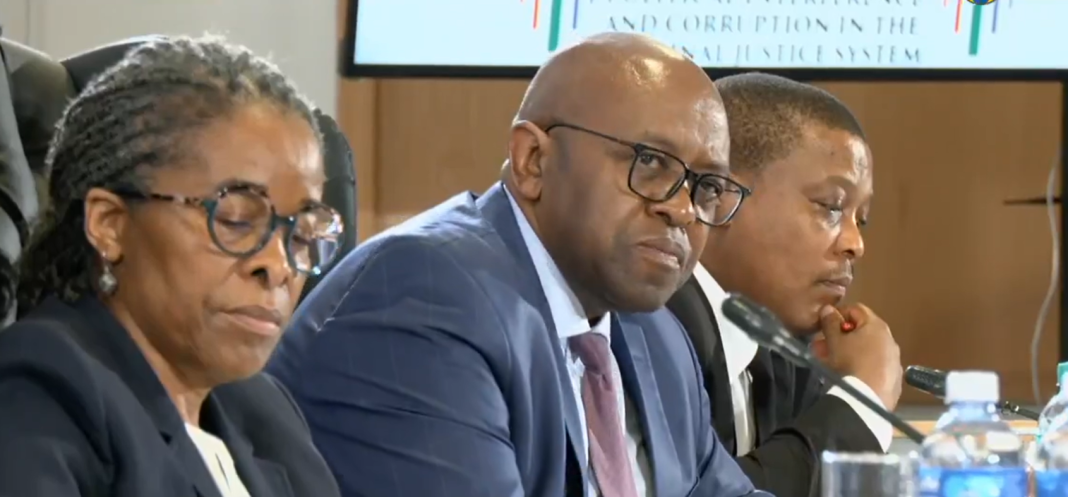By Johnathan Paoli
Former Ekurhuleni Employee Relations head Xolani Nciza continued his testimony before the Madlanga Commission, describing a pattern of interference, incompetence and unlawful conduct by former city manager Imogen Mashazi and legal services head Kemi Behari in relation to the stalled disciplinary inquiry against Brigadier Julius Mkhwanazi, the embattled former EMPD senior officer at the centre of the blue lights scandal.
Testifying on Thursday, Nciza recounted how he received a series of anonymous emails in August 2023 questioning why the disciplinary case against Mkhwanazi had not proceeded.
The same messages, also sent to journalist Jeff Wicks, triggered an urgent meeting called by human resources (HR) head Linda Gxasheka at the instruction of Mashazi.
When he arrived at the city manager’s office, Nciza said the atmosphere was hostile.
He was accused by both Mashazi and Behari of leaking Mkhwanazi’s charge sheet to the media, an allegation he flatly denied.
“I was under attack and had to push back. I defended my office and the integrity of the process,” he testified.
According to Nciza, the charge sheet had been shared with several EMPD officials involved in the disciplinary proceedings, which he described as standard practice.
But Behari insisted the inclusion of Mkhwanazi’s employee number on the document violated the Protection of Personal Information Act (POPIA) and exposed the city to legal risk.
“I asked what was so serious about it. The only personal detail on that document was the staff number, nothing that could compromise anyone’s rights,” Nciza said.
He testified that Mashazi used the alleged leak as a pretext to question his authority over the disciplinary process.
“She claimed I did not have the authority to discipline Julius or to appoint attorneys to investigate him. When I asked who then had the authority, she did not say,” he said.
Nciza told the commission that this was part of a broader effort by the city’s leadership to shield Mkhwanazi from accountability.
He added that Behari repeatedly downplayed the seriousness of the misconduct allegations against the brigadier, saying the evidence was not sufficient and that the infractions were minor.
This, Nciza noted, was despite the fact that Mkhwanazi had allegedly helped tenderpreneur Vusimusi “Cat” Matlala register private security vehicles as EMPD cars and fit them with police blue lights.
Nciza was suspended two weeks after the 21 August 2023 meeting, purportedly over the alleged charge sheet leak.
Following questioning from chairperson Sandile Madlanga, Nciza confirmed that he had later forwarded all the relevant charge sheet correspondence to Behari, as requested.
Later that day, he received a document signed by Mashazi concerning disciplinary procedures in the city.
When he asked HR head Gxasheka to verify its authenticity, she appeared uncertain, further fuelling his concerns about manipulation of internal processes.
Behari previously denied Nciza’s claims that he had blocked the inquiry, saying he merely questioned the sufficiency of the evidence and was protecting the city’s interests.
He conceded, however, that the charges against Mkhwanazi were serious and that he was still investigating why the disciplinary process never resumed.
Throughout his testimony, Nciza maintained that the disciplinary process against Mkhwanazi was derailed by institutional interference from the city’s top leadership, suggesting that both Mashazi and Behari worked to insulate the brigadier from consequences.
A letter later surfaced directing that all disciplinary cases or investigation requests within the city be routed through Behari, before any action could be taken.
The directive required Behari to first confirm the allegations and assess evidence before reporting to HR.
Nciza described this as an unlawful and serious modification of the city’s HR policy, warning it would paralyse internal investigations.
He said it effectively meant EMPD investigators would need Behari’s permission to act, an arrangement he believed was designed to shield Mkhwanazi.
The commission continues.
INSIDE METROS

